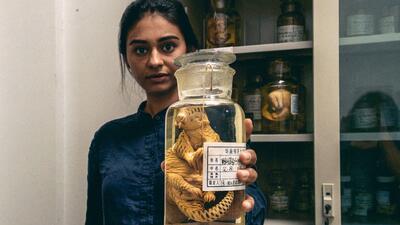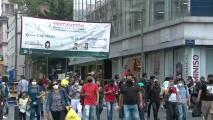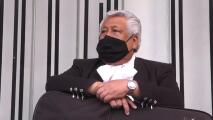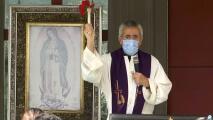'The Traffickers' exposes how black markets move

During an episode of a new FUSION series, The Traffickers, British journalist Nelufar Hedayat is in disbelief as she walks the aisles of a military warehouse in Guatemala City. The shelves around her are stacked with AK47s, M16s, Mausers, rifles and every other variety of military grade weapon. In total, the warehouse holds 22,000 guns -- all of them illegal and seized by Guatemalan authorities.
Hedayat then learns that the warehouse is just one of three in the city.
“I remember looking around and thinking that this isn’t even the tip of the iceberg,” Hedayat, 28, told Univision. “It was a real moment in my career, in my life, when I realized I’m standing in a room of death and this shouldn’t exist.”
There are about a million illegal weapons in Guatemala, and about 500,000 in El Salvador, according to FUSION's interviews. They are weapons that arm gangs and drug traffickers, fueling violence in one of the murder capitals of the world. Many of those weapons -- some estimate 50 percent -- originated from the United States.
Guns are just one of the black market trades explored in the eight-episode series The Traffickers. In an immersive, vivid style, Hedayat takes viewers behind the scenes of the trading of rhinos, human organs, gold, sex and more, talking to the camera with exasperation as she traverses dark underworlds. To make the series, she traveled through 22 countries over a year-and-a-half, working with local journalists in places from Bulgaria to South Africa to Bangladesh.
The result is a harrowing look at the “world between worlds,” as Hedayat says, bringing the audience deep inside “a place they never would have never been.”
But Hedayat often doesn’t have to go far to connect the dots and find the shadow side of trades. Often, some of the most horrific trafficking is happening right in front of our eyes, she says, at places like ports, customs houses and airports.
“It’s easy to look at the cities and towns where we live and think that bad things happen in lands that are far away and that we’re not involved, but that’s not the case,” she says. “It was just eye opening to see the amount of times I ended up in completely legit places talking to criminals or about them. In many cases there’s an underworld living on top of us. Consumers of sex, gold, cobalt and timber are here, now, fueled by greed and demand.”
Hedayat fled war-torn Afghanistan with her mother when she was six years old. As a journalist, she has worked for the BBC, Channel 4 in the U.K., often covering upheaval in hostile places.
Despite her penchant for covering conflict, Hedayat says she was often emotionally affected by what she witnessed while filming The Traffickers. And throughout the show, she shares that openly with viewers.
“I am not the cargo pant-wearing, white male journalist that will go in and give you the truth with a Capital T. You have to give yourself that,” she says.
In The Congo, Hedayat discovers that thousands of dollars paid by American families to adoption agencies may have been embezzled. In Vietnam, she meets an importer who has a supply of rhino horn from South Africa; a whole horn costs around $300,000. In rural Bangladesh, she tracks down villagers who have sold their organs and explores the impact that has had on their lives.
As the series shows, trafficking is far more than individual stories. The numbers surrounding the world’s underground markets tell a horrific story.
In the last 40 years, 95 percent of the rhino population has been lost, FUSION reports. Counterfeit pharmaceuticals capture an estimated $200 billion in the black market per year, and human trafficking is a $32 billion global industry.
“We all share this one planet, for better or worse,” Hedayat says. “From guns to gold to sex workers, we need to see how we’re inherently involved in it all. We need to open up our eyes. We need to interact with it.”
Watch the final two episodes of The Traffickers this Sunday at 10PM on FUSION or get a season pass now at itunes.com/TheTraffickers.




